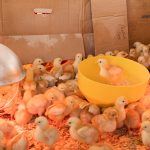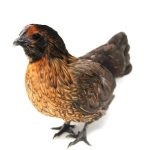Chickens, like all animals, have specific needs that must be met in order for them to thrive, especially during the winter months. Understanding these needs is crucial for ensuring the health and well-being of your flock. In winter, chickens require a warm and dry environment to protect them from the cold and damp conditions.
They also need access to fresh water and a balanced diet to maintain their energy levels and immune system. Additionally, chickens need protection from frostbite and other cold-related health issues. By understanding and addressing these needs, you can help your chickens stay healthy and comfortable throughout the winter.
Chickens are sensitive to cold temperatures and can suffer from hypothermia if they are not provided with adequate shelter. They also need protection from drafts, as these can cause stress and illness. In addition to warmth, chickens also need access to natural light to maintain their circadian rhythms and overall well-being.
It’s important to understand that chickens are social animals and benefit from being kept in a flock, as this provides them with warmth and companionship. By understanding the social and environmental needs of chickens in winter, you can create a suitable living environment that promotes their health and happiness.
Table of Contents
- 1 Providing adequate shelter for chickens in winter
- 2 Ensuring proper nutrition for chickens in winter
- 3 Implementing measures to prevent frostbite in chickens
- 4 Managing water sources for chickens in winter
- 5 Monitoring the health of chickens in winter
- 6 Considering additional measures for extreme winter conditions
- 7 FAQs
Key Takeaways
- Chickens need extra warmth and protection in winter due to their susceptibility to cold temperatures
- Adequate shelter should be provided, such as insulated coops with proper ventilation and dry bedding
- Proper nutrition is essential, including a balanced diet with increased protein and access to fresh water
- Measures to prevent frostbite include applying petroleum jelly to combs and wattles and avoiding wet conditions
- Water sources should be kept from freezing, using heated waterers or frequent water replacement
- Regular health checks should be conducted to monitor for signs of illness or distress
- Additional measures for extreme winter conditions may include supplemental heating and extra insulation for coops
Providing adequate shelter for chickens in winter
Coop Conditions
The coop should be well-lit to provide natural light, which is important for the chickens’ overall health and well-being. The coop should also be spacious enough to accommodate the flock comfortably, with enough roosting space for each bird.
Outdoor Access
In addition to the coop, chickens also need access to a run or outdoor area where they can stretch their legs and get some fresh air. This area should be protected from snow and ice, with a solid surface to prevent slipping and injury.
Additional Considerations
Providing a covered area in the run can also give the chickens a place to escape from the elements while still getting some exercise. By providing adequate shelter for your chickens in winter, you can help them stay warm, dry, and healthy throughout the colder months.
Ensuring proper nutrition for chickens in winter

Proper nutrition is essential for the health and well-being of chickens, especially during the winter months. In winter, chickens require a balanced diet that provides them with the nutrients they need to maintain their energy levels and immune system. This includes a mix of grains, seeds, fruits, vegetables, and protein sources such as mealworms or crickets.
It’s important to provide a high-quality feed that is specifically formulated for chickens, as this will ensure that they are getting all the essential nutrients they need. In addition to their regular feed, chickens may benefit from supplements such as vitamins and electrolytes to support their immune system and overall health during the winter months. It’s also important to ensure that the chickens have access to fresh water at all times, as dehydration can lead to health issues such as reduced egg production and increased susceptibility to illness.
By ensuring proper nutrition for your chickens in winter, you can help them stay healthy and strong throughout the colder months.
Implementing measures to prevent frostbite in chickens
Frostbite is a common concern for chickens during the winter months, especially in areas with extreme cold temperatures. To prevent frostbite, it’s important to provide adequate shelter for the chickens, with insulation and proper ventilation to keep them warm and dry. It’s also important to protect the chickens’ combs and wattles from frostbite by applying petroleum jelly or a similar protective balm.
Additionally, providing extra bedding in the coop can help keep the chickens warm and prevent frostbite on their feet. In addition to these measures, it’s important to monitor the chickens for signs of frostbite, such as pale or discolored skin on their combs, wattles, or feet. If frostbite is detected, it’s important to take immediate action to warm up the affected areas and prevent further damage.
By implementing measures to prevent frostbite in your chickens, you can help them stay healthy and comfortable throughout the winter months.
Managing water sources for chickens in winter
Managing water sources for chickens in winter is crucial for ensuring their health and well-being. Chickens require access to fresh water at all times, as dehydration can lead to health issues such as reduced egg production and increased susceptibility to illness. In winter, it’s important to prevent water from freezing by using heated waterers or regularly replacing frozen water with fresh water.
It’s also important to ensure that the waterers are placed in a sheltered area to protect them from snow and ice. In addition to managing water sources, it’s important to monitor the chickens for signs of dehydration and ensure that they are drinking enough water. Providing warm water can encourage the chickens to drink more during cold weather.
By managing water sources for your chickens in winter, you can help them stay hydrated and healthy throughout the colder months.
Monitoring the health of chickens in winter

Regular Observation
It’s essential to observe the chickens regularly for signs of illness or distress, such as lethargy, reduced appetite, or abnormal behavior. Additionally, monitoring their egg production and quality can indicate underlying health issues.
Conducting Health Checks
In addition to regular observation, it’s vital to conduct regular health checks on the chickens. This includes checking their combs, wattles, feet, and overall condition. Monitoring their weight and body condition score ensures they maintain a healthy weight throughout the winter months.
Taking Proactive Action
By monitoring the health of your chickens in winter, you can identify any potential issues early on and take appropriate action to keep them healthy and strong.
Considering additional measures for extreme winter conditions
In extreme winter conditions, additional measures may be necessary to ensure the health and well-being of your chickens. This may include providing extra insulation in the coop, using heat lamps or heated perches to keep the chickens warm, or even bringing them indoors if outdoor conditions become too severe. It’s also important to consider the impact of extreme cold on other aspects of chicken care, such as egg production and feed consumption.
In addition to these measures, it’s important to have a plan in place for emergencies such as power outages or severe weather events. This may include having backup heating sources or alternative water sources available in case of an emergency. By considering additional measures for extreme winter conditions, you can ensure that your chickens are prepared for any challenges that may arise during the colder months.
In conclusion, understanding the needs of chickens in winter is essential for ensuring their health and well-being throughout the colder months. By providing adequate shelter, proper nutrition, and implementing measures to prevent frostbite, managing water sources, monitoring their health, and considering additional measures for extreme winter conditions, you can help your chickens stay healthy and comfortable during the winter months. With proper care and attention, your flock can thrive even in the coldest of winters.
If you’re looking for tips on keeping chickens alive in winter, you might also be interested in learning about how long it takes for chicken eggs to hatch naturally. Check out this article for more information on the incubation process and what to expect when hatching chicken eggs.
FAQs
What are some tips for keeping chickens alive in winter?
Some tips for keeping chickens alive in winter include providing a draft-free coop, insulating the coop, using heated waterers, providing extra food, and ensuring adequate ventilation.
How can I keep my chicken coop warm in winter?
You can keep your chicken coop warm in winter by insulating the walls and roof, using a heat lamp or heated pad, providing extra bedding, and sealing any drafts.
What should I feed my chickens in winter?
In winter, you should feed your chickens a balanced diet that includes a mix of grains, seeds, and protein. You can also provide extra treats like mealworms or scratch grains to help keep them warm.
Do chickens need extra water in winter?
Yes, chickens need extra water in winter. You should provide heated waterers to prevent their water from freezing, and check them regularly to ensure they have access to water at all times.
How can I prevent frostbite in my chickens during winter?
To prevent frostbite in chickens during winter, you can apply petroleum jelly to their combs and wattles, provide adequate ventilation in the coop to prevent moisture buildup, and avoid handling them in extremely cold temperatures.
Meet Walter, the feathered-friend fanatic of Florida! Nestled in the sunshine state, Walter struts through life with his feathered companions, clucking his way to happiness. With a coop that’s fancier than a five-star hotel, he’s the Don Juan of the chicken world. When he’s not teaching his hens to do the cha-cha, you’ll find him in a heated debate with his prized rooster, Sir Clucks-a-Lot. Walter’s poultry passion is no yolk; he’s the sunny-side-up guy you never knew you needed in your flock of friends!







